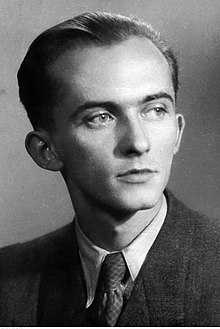Jerzy Ficowski
Jerzy Ficowski | |
|---|---|
 | |
| Born | 4 October 1924 Warsaw, Poland |
| Died | 9 May 2006 (aged 81) Warsaw, Poland |
| Language | Polish |
| Genre | Poetry, prose |
Jerzy Tadeusz Ficowski (Polish pronunciation: [ˈjɛʐɨ fiˈt͡sɔfskʲi]; 4 October 1924 in Warsaw – 9 May 2006 in Warsaw) was a Polish poet, writer, ethnographer and translator (from Yiddish, Russian, Romani and Hungarian).
Biography and works
During the
After the war, Ficowski returned to Warsaw and enrolled at the university in order to study philosophy and sociology. There he published his first volume of poetry, Ołowiani żołnierze (The Tin Soldiers, 1948). This volume reflected the
His early works show the influence of
From 1948 to 1950 Ficowski chose to travel with Polish Gypsies and came to write several volumes on or inspired by the Roma way of life, including Amulety i defilacje (Amulets and Definitions, 1960) and Cyganie na polskich drogach (Gypsies on the Polish Roads, 1965). He was the member of the Gypsy Lore Society and translated the poems of Bronisława Wajs (Papusza). He was interested in many aspects of international poetry. He translated the poems of the Spanish poet, Federico García Lorca, and he was also a known specialist of Jewish folklore and Modern Hebrew poetry, becoming an editor of the Jewish poem anthology Rodzynki z migdałami (Raisins with Almonds, 1964).
Ficowski devoted many years of his life to the study of the life and works of
As a consequence of his signing, in 1975, of the
Under the communist regime he had urged his fellow writers to voice their concerns over censorship and the suppression of workers. His most public statement was a letter to the Writers Union in which he said, "I do not believe deeply in the immediate effectiveness of letters to the government, but even less do I believe in the effectiveness of silence."
Following the
Selected publications

- Poetry
- Ołowiani żołnierze (1948)
- Zwierzenia (1952)
- Po polsku (1955)
- Moje strony świata (1957)
- Makowskie bajki (1959)
- Amulety i defilacje ("Amulets and Definitions") (1960), inspired by his stay with Gypsies
- Pismo obrazkowe (1962)
- Ptak poza ptakiem (1968)
- Odczytanie popiołów (1979); on the Jews and their suffering; illustrated by Marc Chagall; translated by Keith Bosley as A Reading of Ashes, 1981)
- Errata (1981)
- Śmierć jednorożca (1981)
- Przepowiednie. Pojutrznia (1983)
- Inicjał (1994)
- Mistrz Manole i inne przekłady (2004; collected translations of poetry)
- Zawczas z poniewczasem (2004)
- Pantareja (2006)
- Poetic prose
- Wspominki starowarszawskie (1959)
- Czekanie na sen psa (1970; translated by Soren A. Gauger and Marcin Piekoszewski as Waiting for the Dog to Sleep, 2006)
- Others
- Cyganie polscy (1953)
- Cyganie na polskich drogach (1965)
- Gałązka z drzewa słońca (1961)
- Rodzynki z migdałami (1964)
- Regiony wielkiej herezji (1967, revised editions 1975, 1992, 2002; translated by Theodosia S. Robertson as Regions of the Great Heresy, 2000)
- Okolice sklepów cynamonowych (1986)
- Demony cudzego strachu (1986)
- Cyganie w Polsce. Dzieje i obyczaje (1989; translated by Eileen Healey as The Gypsies in Poland. History and Customs, 1989)
- Letters and Drawings of Bruno Schulz, with Selected Prose (1988, edited by Jerzy Ficowski; translated by Walter Arndt, with Victoria Nelson Harper & Row, NY)
References
- Moszczynki, Wiktor (2006-06-06). "UK Guardian Newspaper Obituary". The Guardian. London. Retrieved 2010-05-06.
